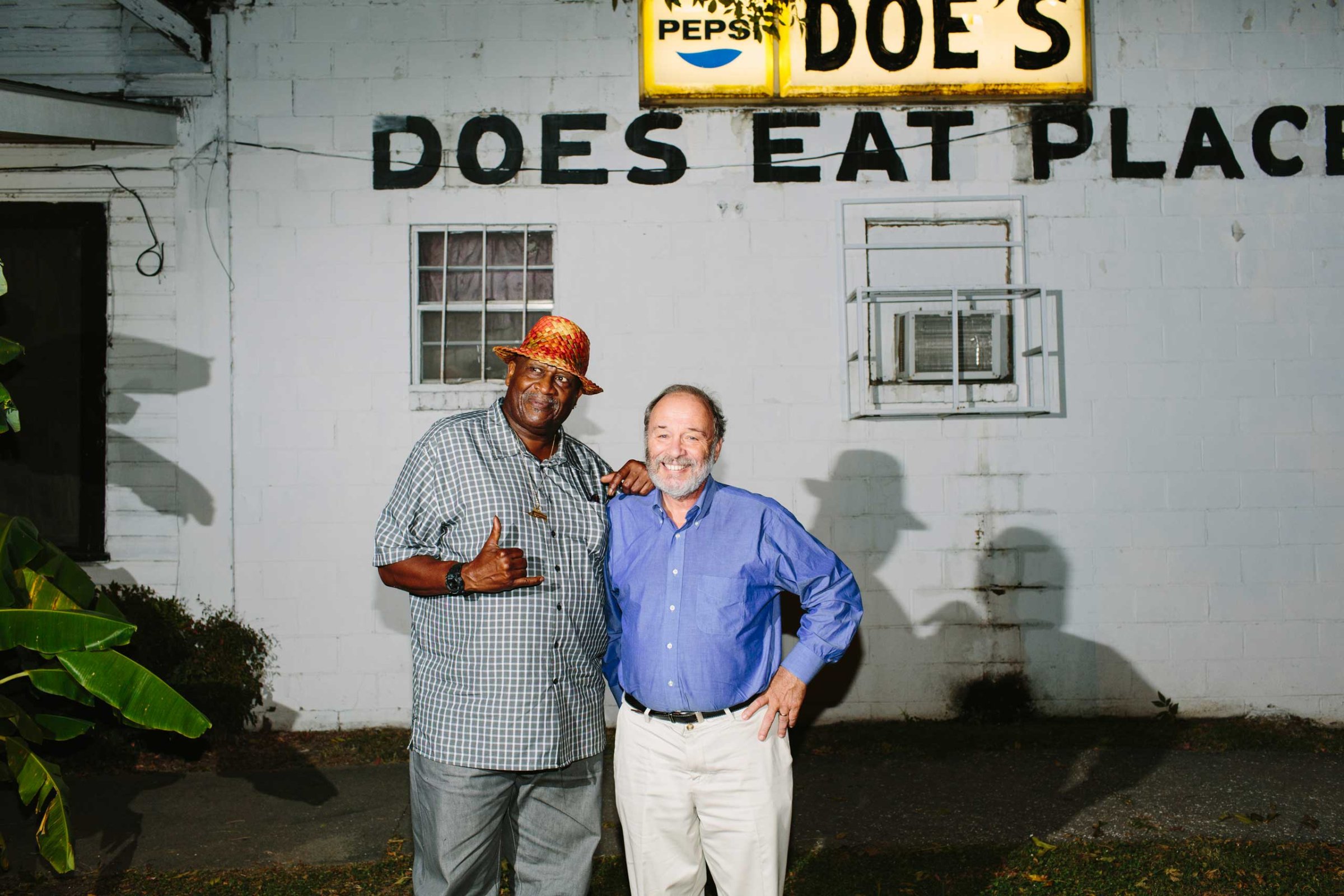
New Orleans
There is one basic rule when a musician comes along on one of my road trips: You don’t have to play. I like musicians, love the way they see and hear things. It’s nice when they do play–as Ry Cooder did last year–and a little disappointing if they don’t. The great American blues musician Taj Mahal brought his guitar and five-string ukelele along for the ride, but he chose not to bring them to the New Hope First Baptist church. “You don’t play my music in churches down here,” he explained. “It’s the devil’s music and I don’t sing gospel.”
Ah, the old bifurcation between blues and gospel. After all, the devil did teach Robert Johnson how to play the blues out on Highway 61, which we drove from Memphis to Greenville. Taj was blown away by the Greenville town meeting, which you can read about here. And so was I. There were more than a few things said that I couldn’t fit into that column; it got pretty fascinating when I asked the assembled black public officials about President Obama. “I love my President,’ said Lawrence Browder, a chancery court clerk. “I love the man, but he’s allowed himself to be compromised by the people around him. He’s unwilling to kick butt. You know, you talk about executive orders–the Emancipation Proclamation was an executive order, right?”
“I cut him some slack,” said state rep. Rufus Straughter. “He’s a Hawaiian.” I asked what that meant and Rep. Straughter responded with a story. “My grand-daddy bought a John Deere tractor in 1942 and word got around the community. One day a white guy pulls up to the house and asks about the tractor. My grand-daddy says yes, he’s got it. The white guy is amazed. He says, ‘How could you get this tractor and I can’t?'” There was a round of laughter from the 25 people in the room. “See, there was an assumption of inferiority,” Straughter concluded. “All of us had to grow up with that. The President was brought up by white people–his grandparents–in Hawaii. He never grew up with that bigotry.”
Taj Mahal was biting his lip at this point. He spent 20 years living in Hawaii. “Of course, Obama grew up with bigotry,” he told me later. “There are all sorts of cross-currents in Hawaii. There’s a Hawaiian phrase for what Obama is.” He said the phrase, but I was driving and couldn’t write it down. “You know what it means? It means ‘people who pray with their mouths closed.’ Hawaiians make a lot of noise when they pray.” And he launched into an intense and hilarious imitation of Hawaiian praying.
Taj is a great impersonator. He can do a mean Bob Dylan, an elderly Jew from his Brooklyn birthplace, a valley girl and several different varieties of Creole patois. When a Dylan song from Nashville Skyline came on, Taj said, respectfully. “That boy had to do hard work to change his voice to sing like that.” I’ve been listening to Taj for 45 years, since his great double album, “Giant Step” and “De Old Folks at Home,” the latter a combination of acoustic blues, clapping songs and chants. He went on to record an album with a tuba band and his Hawaiian group, The Hula Band, which featured more than a couple of ukeleles. More recently, he’s gone back all the way to the roots of the music, in Africa. In the midst of all this, he played with the Rolling Stones and more than a few other white superstars, who aspired to sound like him–and sold a lot of records then he did, trying.
Taj was as blown away by the Greenville town meeting as I was, especially when the folks started talking about integration. They felt suckered by it. They had abandoned their black institutions–the stores, restaurants, banks and newspapers–and rushed to patronize the whites. And they had lost their community, in the process. And here Taj could not remain silent, “Y’all built the levy,” the civil rights movement, “and then what did you do? You sat down, splayed out your legs, put your shovels across your laps and stopped digging. My grandfather”–from South Carolina–“talked about it all the time. You can’t stop building. You gotta keep at it.”
There was general agreement in the room. And I could see Taj was feeling pretty good about that. I was kind of hoping that he’d break into one of his clapping songs here…But he didn’t. He was in church with a bunch of elected officials. The next day, as we drove to New Orleans, he sang some offhand blues, but mostly he talked about how the conversation in Greenville was the eternal conversation in the black community. We had dinner in New Orleans that night with my wife, Victoria, and a lady friend of his, whom he called “Big Red.” He bought.
More Must-Reads From TIME
- The 100 Most Influential People of 2024
- Coco Gauff Is Playing for Herself Now
- Scenes From Pro-Palestinian Encampments Across U.S. Universities
- 6 Compliments That Land Every Time
- If You're Dating Right Now , You're Brave: Column
- The AI That Could Heal a Divided Internet
- Fallout Is a Brilliant Model for the Future of Video Game Adaptations
- Want Weekly Recs on What to Watch, Read, and More? Sign Up for Worth Your Time
Contact us at letters@time.com